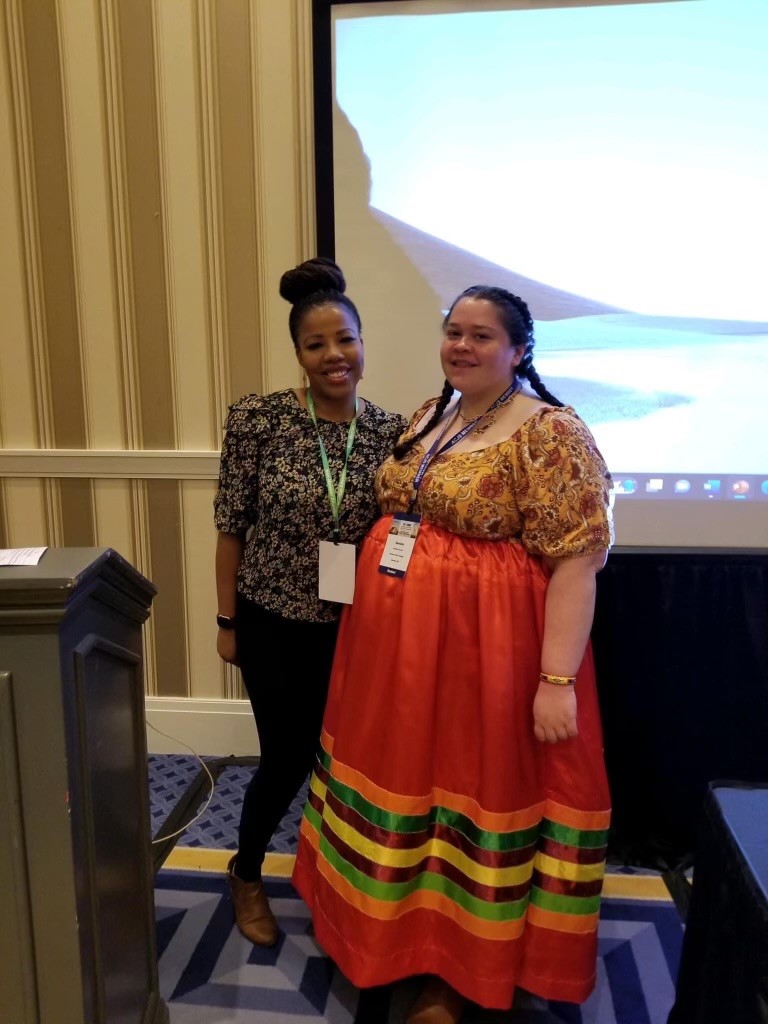Covolo makes national presentation about healing for indigenous people

CHADRON – In March, Danielle Covolo, a lecturer of Justice Studies at Chadron State College and doctoral student at the Indiana University of Pennsylvania gave a presentation about the healing practices of the Oglala Lakota Tribe at the Academy of Criminal Justice Sciences (ACJS).
Her gender and racial justice paper panel presentation in National Harbor, Maryland, was titled Healing Through Reconnecting to Culture for Missing and Murdered Indigenous Women, Girls, and Two-Spirited Folx (pronounced folks). Folx is a plural noun used to explicitly signal the inclusion of groups commonly marginalized, Covolo said.
“I’m thankful to all the people who shared their knowledge with me, encouraged me to braid my hair, made my ribbon skirt, and gave me beautiful traditional artwork to wear. All of these things were done to show respect for Missing and Murdered Indigenous Women, Girls, and Two-Spirit People and their relatives. Is it important to remember that the knowledge I shared belongs solely to the Oglala Lakota,” she said.
She discussed pre-colonization and pre-governmental genocide of Native Indian and Alaskan Native in 1491 and forced migrations of the communities restricting them to 79,000 square miles by 1981. She said between 150 and 300 Oglala Lakota were killed at the 1890 Wounded Knee Massacre. Covolo cited 2016 research stating that 50 percent of all Native Indian and Alaska Native women have experienced sexual violence in their lifetime, often committed by non-native offenders.
“The bodies of the Oglala Lakota were further violated by being discarded in a mass grave, denying those fallen proper Oglala Lakota traditional burial rites. Only 25 Army soldiers were killed during the battle and 20 Medals of Honor were awarded to soldiers,” Covolo said.
Covolo said throughout decades, additional horrors have included sterilization by medical providers through the Indian Health Service under the guise of harmless procedures such as appendectomies. Some women sterilized directly after giving birth were told by physicians that the procedure was medically necessary. From 1819 to 1969, the federal government relocated children to 408 federal schools across 37 states or then territories, including 21 schools in Alaska and seven schools in Hawaii.
After outlining the past, she turned her attention to healing through cultural practices. She quoted professor, researcher, and author Dr. Elvira Pulitano who said, “Simply making sense of what is happening can also be a healing place.”
“Pow-wows, feedings, medicines, music, dance, and drumming circles are seen as restorative practices that provide opportunities for family and community members to deepen bonds. These practices emphasize the individual is not alone and interrupt the colonial tactic of divide and conquer. Many pow-wow gatherings are already highlighting the issue of missing and murdered women through ribbon skirts or shirts with red handprints to signify and honor those who are missing or murdered,” she said.
Sundance, the telling of oral histories or Wiwáŋyaŋg Wačhípi can bind current and past generations. The practice, also called time-binding, involves dancing, singing, and drumming for four days. It was outlawed in the 1880s for several decades.
The Women’s Ceremony or Išnáthi alówaŋpi is a coming-of-age rite during which all food and drink are administered to girls by caretakers to further reestablish and strengthen bonds within the Oglala Lakota community.
The final healing practice she explained was Making of a Relative. The traditional process of Huŋkálowaŋpi includes celebrations that included dance, traditional food, and the pledger receiving a spirit name.
Category: Campus News, Justice Studies
